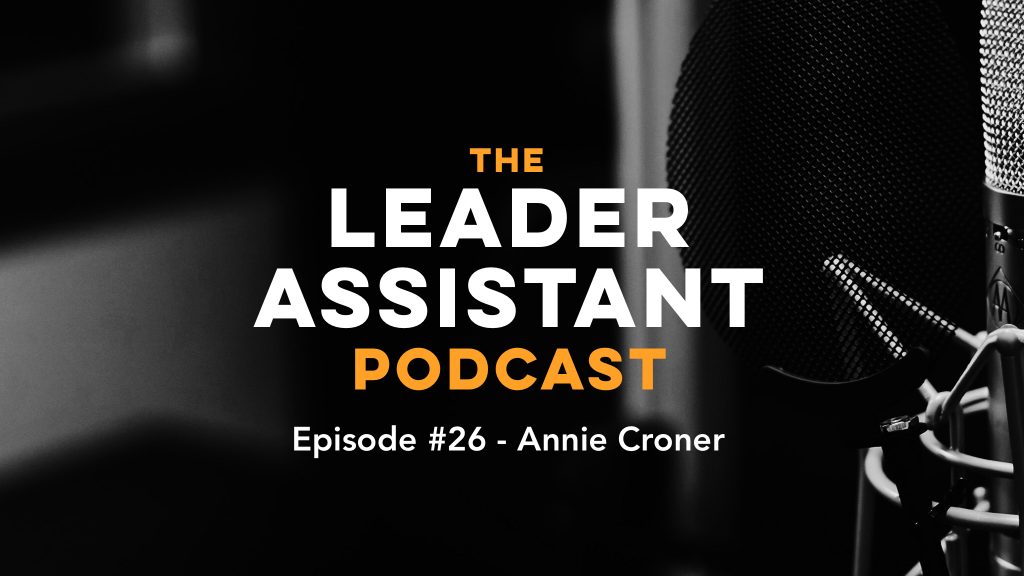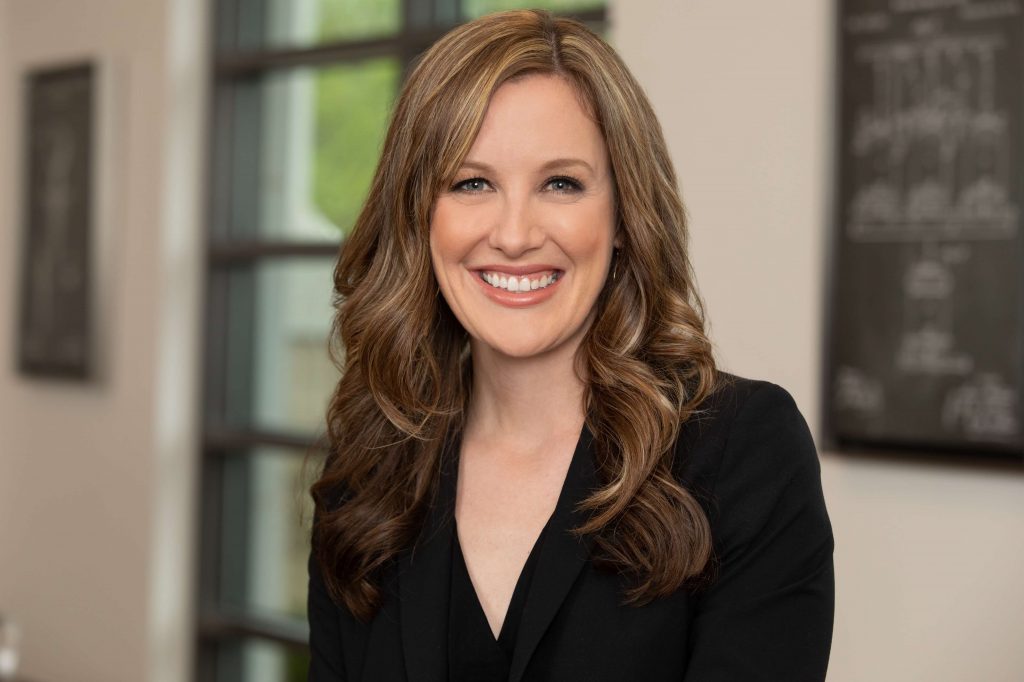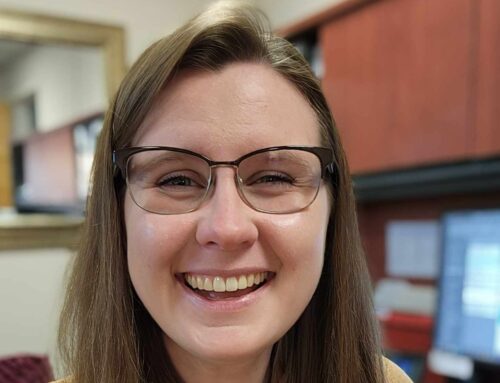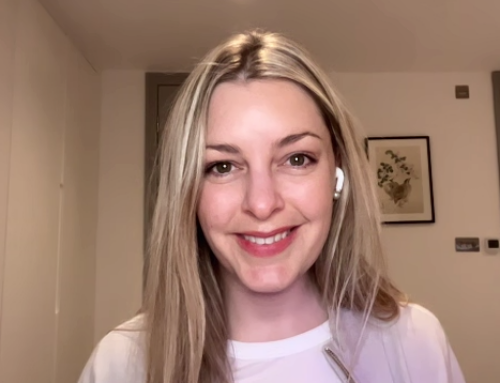I love the internet. I’ve met so many people online I would have never met otherwise, including today’s guest, Annie Croner.
This episode was fun because I had already been interviewed by Annie for her website, so it was nice to return the favor and be the one asking the questions this time around.
Annie founded Whole Assistant to empower and encourage assistants and I’m thrilled to share my conversation with her in this episode!
We dive in to productivity tips, thoughts on starting a blog, what to do when you make a mistake, and much more.
If you’re interested in hearing Annie interview me on her site, you can check out our prior conversation here.
LEADERSHIP QUOTE
Don’t follow the crowd, let the crowd follow you.
– Margaret Thatcher
CONNECT WITH ANNIE
About Annie Croner
Annie has been an assistant for over 17 years and started Whole Assistant out of a strong desire to empower and encourage other assistants to create a career and life they love.
She geeks out on all things productivity and in her free time enjoys dancing Tango, going to happy hour with her friends, and living in a house full of boys.
SUBSCRIBE
Subscribe to The Leader Assistant Podcast so you don’t miss new episodes!
You can find the show on Apple Podcasts, Spotify, Google Podcasts, and Stitcher.
Join my email list here if you want to get an email when a new episode goes live.
JOIN THE COMMUNITY
Join the Leader Assistant Facebook Group here for bonus content and to network with other assistants who are committed to becoming leaders!
LEAVE A REVIEW
If you’re enjoying the podcast, please take 2 minutes to rate and review the show on iTunes here. Each review helps me stay motivated to keep the show going!
—
EPISODE TRANSCRIPT
Annie Croner 0:00
Hi, I’m Annie Croner and today’s leadership quote comes from Margaret Thatcher. Don’t follow the crowd. Let the crowd follow you.
Podcast Intro 0:11
The Leader Assistant Podcast exists to encourage and challenge assistants to become irreplaceable. Game Changing leader assistants. Subscribe at podcast dot leader assistant.com
Jeremy Burrows 0:23
Hey, everybody is episode 26 Annie Croner has been an assistant for over 17 years, she started wholeassistant.com out of a strong desire to empower and encourage other assistants to create a career and a life they love any enjoys dancing tango, going to happy hour with her friends and living in a house full of boys. You can catch today’s show notes at leaderassistant.com/26. I hope you enjoy our conversation. Hey, everyone. Thanks for tuning in to The Leader Assistant Podcast. Today. I’m excited to have Annie Croner from whole assistant.com On the show today. Hi, Annie, thanks for joining me.
Annie Croner 1:08
Thank you, Jeremy. I’m really excited to be here.
Jeremy Burrows 1:11
So let’s start at not quite the beginning. But what was your very first job.
Annie Croner 1:18
My very first job was working in a snack stand in the park when I was 15 years old. And my mom’s best friend, she had two boys who are a year and two years older than I was. And so it was largely them and their buddies running the show, but and their grandparents, like owned the snack stand. And so they realized that they needed someone who would actually work this next day and not just like hang out and play. So Exactly, yes. Yes. So that was my very first job. Actually, I really enjoyed it, even though I was around boys all the time. Because, and and it taught me some really great lessons, I think, first of all, like how to deal with the public. So we had this one gentleman who was always on his bicycle. Who was homeless, who would always stop by and say hello, you know, so I got I got interaction with a variety of different people, which is helpful for any of us, especially as assistants. So that was my very first job.
Jeremy Burrows 2:19
What was your favorite snack that you sold? Well, actually,
Annie Croner 2:23
we made really good burgers. And I know that sounds weird, but like my dad would actually stop by every day for a burger. And so I did like the burgers that we made, there was something about how, how these guys, these kids, grandparents season the meat that was really good.
Jeremy Burrows 2:40
Awesome. So when and why did you become an assistant.
Annie Croner 2:44
So in college, I, I decided to take a year off and claim residency, I went to a state school that I wasn’t a member of the State of and so I decided to look for a position and actually a gal offered me a position and like why don’t have any experience. And she said, that’s really good. Because that way you won’t have any preconceived ideas. And I can kind of mold you into the administrative assistant I want you to be and it was a receptionist role. I can I can actually kind of help help you become what it is, I think the receptionist should be and what we need for this current position. So I took the position and I liked it a lot. And then I also ended up working at I studied theater theater design at University of Iowa. And I ended up working in the theatre office as well. And so those are my first two interactions. And I think for me at the time, it was just a way to pay the bills, even though I was good at it, and I enjoyed it. And then post college, the same thing kind of happened. I moved to Boston with my theatre degree and I was going to design for a theater out there. And it took a position out there. And I just noticed that my boss, her name is Marianne and we’re still friends to this day. And we’re still she’s still I consider her my mentor. She She was my boss in Boston at this consulting firm. And I just noticed, like how she interacted with her executive. She was also an executive assistant in addition to managing the office. And I just I really, I just kind of sat back and admired how the relationship was just so mutually respectful. And at some point I ended up letting go of theater because the work life balance wasn’t what I wanted. I didn’t want to be in a theater all night and have a potential significant other work all day and I had just noticed that anybody with any level of success in my world, as a theatre designer sacrificed a lot on the whole on front and on the personal front. And I was not willing to do that. And so I just, I watched Mariana and her Exec. And I just decided, no, that’s what I want. That right there. I want the mutual respect. I want the, the partnership, I want the strategic partnering with my Exec. And so I think that’s what led me ultimately to consider what I do now as an executive assistant as a potential career path for
Jeremy Burrows 5:30
you saw saw somebody else model, a healthy Assistant Executive relationship, and you wanted that.
Annie Croner 5:36
Exactly, yeah.
Jeremy Burrows 5:38
So what industries have you worked in as an assistant? And how long have you been one?
Annie Croner 5:44
So I’ve been an assistant for nearly 18 years now. And I have worked in anything from churches, I’ve worked in to churches, actually, to whole Gosh, consulting, add to accounting. And I’m currently in the venture capital world. The executive I support works as a managing director in VC. And in a venture capital firm based in San Francisco. However, we are both in Colorado. So it’s just he and I here. And I have to say, I love it.
Jeremy Burrows 6:17
So awesome. Yeah. Do you have any interesting or crazy stories from your career as an assistant?
Annie Croner 6:24
Oh, my gosh, so many, so my favorite one, so when I worked, I worked at an Episcopal cathedral for a while, a few years ago. And I found out that I was not only going to be managing, like three or four executives, I was also going to be managing our Crips, which I didn’t even know what a crypt was, at the time, you know, you hear like, like Tales from the Crypt and all that sort of stuff and like Crips really. So I do have some crazy stories from doing that. One was this gal that came to purchase a crypt with her son and, and there and they decided that they, like wanted to purchase a specific crypt. And so the son asked the mom, he’s this guy’s in his late 30s or 40s asked his mom to take a picture of him standing on the credit. Because the Crips are in this sidewalk and actually, like in the sidewalk of the cathedral. And and he texted the picture to his brother’s like, we just bought real estate sleeps for and I’m like, Oh my gosh, that’s so crazy. So I have lots of experiences from crip keeping that are just kind of offer a little bizarre that most people can’t say they have but I was an actual Cryptkeeper so
Jeremy Burrows 7:40
so for those for those listening that don’t know what a crypt is, are those interviewing you that don’t know what a crypt is? Can you explain?
Annie Croner 7:49
Yes, so, um, so a crypt is it’s a, it’s a place where people put their ashes when they after they are deceased. So so it’s not unlike they don’t actually put the full bodies in our Crips. Anyway, there are cribs where they do that, but they just put the ashes. So the church has this like little plot of it’s a sidewalk actually where you pull up the stone and then you bury the person and then you put the stone back. And so that is correct. I probably should have explained that upfront. Yeah,
Jeremy Burrows 8:22
that’s right. I’m sure many people know what it is. I was I was homeschooled. So you know, sometimes things slipped by? Well, is there a time when you saved the day? I’m sure there’s I’m sure there’s hundreds of times when you saved the day. But is there a time you can think of a remember that? Kind of maybe it was the last minute crazy, you know, you save the day for your executive?
Annie Croner 8:44
Yes, definitely. I think, you know, recently, we had something come up to where my, my executive was in Vegas, and he needed to be home. And they had this crazy ice storm in Vegas. And they were grounding planes. And then we’re like, Okay, so let’s look at calot let’s look this evening at California to get a flight out. Well, the the highway was actually close to California. So then we’re looking we’re going the other way. So I think I finally we finally got him a flight home. He had to drive he had to take a car service two hours to get to his flight, I think it was in Utah was where his flight was or Nevada like Northern Nevada, something like that. I can’t remember but it was two hours away from from Vegas. And and he needed to be back because another person was flying in to meet with him the next day. So there was no option like we had to get him back. And so you know, things like that come up. fairly frequently. I think things where you can’t control things, it things that you can’t control like weather and people’s schedules or things happening, you know, just you have to kind of roll with those punches. is so
Jeremy Burrows 10:01
yeah. So what was the biggest mistake you’ve made as an assistant? And what did you learn from the experience?
Annie Croner 10:09
Sure. So I think the biggest mistake I’ve ever made, I was working for this executive. And she was really, really great. And she told me up front, she’s like, You cannot, there are no boundaries with us, you cannot cross the line, she actually told me that you cannot cross the line. So I would, I would submit wire transfers for her and she would, she would subsequently like, approve them. So you know, she knew what was going on. But there was this one time where she was unreachable. And I submitted everything and approved it for her. And so I created like an electronic signature, and then put that on the document, which I know I shouldn’t have done. But at the time, it just seemed like what you do, right? Like, it just seemed like, oh, yeah, this one would do to get it done. And then I sent it, and then I had this sickening feeling in the pit of my stomach. And like, oh, you know, she said that there are no boundaries between us. And she said that there are no that I can’t cross the line. But I think I just crossed a line. So I immediately, like wrote her an email, and I said, Look, I’m really sorry, I, I’m guessing that you’re probably not going to be okay with this, even though like, this is my understanding. I’d only been working there for just a few months. So we’re still figuring each other out. And, and, and she called me immediately, and she’s like, You know what, I, you’re right, I am not comfortable with that at all, at all. And she said, but thank you so much for telling me. And actually, that that incident really strengthened our trust of one another and our connection. Because I think from then on, she knew like a person of integrity, and that she really could trust me. So anytime I ever hear of an of an executive assistant, like trying to cover their tracks, I’m like, don’t do that girl, just run, run with a solution, figure out the solution and then run to your boss of it, because it can actually serve to strengthen your relationship. So I think that was a very valuable lesson I learned from a very sticky and not so great oversight and and snafu on my part.
Jeremy Burrows 12:24
Well, what’s the one thing that you’re most proud of?
Annie Croner 12:32
You know, I’m really good at developing developing methods and systems. And so I think one project that I’m really proud of most recently is implementing a CRM for our VC firm. And because it was a huge undertaking, and I had to learn the platform, and I been a part of implementing another CRM at another place had worked. So I was familiar with the process, and I was familiar with the snags and the pushback we were gonna get from some people. So I already knew that upfront. And so yeah, I think I think the one thing that, that I’m proud of is my ability to develop systems and to and to work with people in order to implement them, especially this CRM.
Jeremy Burrows 13:29
Yeah, it’s one thing to implement a system. That’s another thing to implement it where you consider everybody that has to use it, not just for one angle.
Annie Croner 13:39
Yes, and that’s a challenge, right? That’s like, that’s a big challenge. And also, like, the resistance to change, because we’ve been doing things a certain way for so long. So I think both of those are the biggest challenges. And when you implement anything, company wide, or a department wide, for sure,
Jeremy Burrows 13:57
what’s one productivity hack you can’t live without.
Annie Croner 14:02
So I, I use Trello to manage my to do list and I put time parameters around every task on my list. And the reason I do this is because while a I feel like it keeps my perfectionist tendencies at bay, like if I only have a half hour to complete a task, then I’m not going to be obsessing over the right making sure the right thing is done or the right choice or, or like the right method. I’m just going to get it done. And and so I think it does it it does that and I think another thing it does is it keeps me on task. Because in this world with so many distractions and Jeremy you’ve created a course about this, so many distractions. It can be really easy to get distracted and to like pop on to Facebook or whatever. But if I’m going to get something done, I’m going to get it done in this amount of time. I do not have a band With or, or, or energy or time to go to go in and look at Facebook or to get distracted or to noodle around on my phone. So I think that’s one productivity hack that I’ve really been enjoying lately.
Jeremy Burrows 15:17
What are some things that you’ve seen executives do really well, when working with their assistants?
Annie Croner 15:25
You know, I think trust is a big thing. And so I think I think letting go is another thing. So those two go hand in hand. So once you’ve got once you’ve developed a trust with your executive, and there are several ways to do that I won’t go into right now I feel like, I feel like I feel like executives, I know for myself, whenever whenever I’m trusted to make a decision, then I’m just that much more invested in my role. And, and so I think, as much as you as much as they can let go. And I think that’s the hardest part for executives sometimes is letting go. And trusting that they’re that they’re executive assistant has their back, I would say that that is one thing that really makes an executive stand apart from another executive from other executives in terms of being easy to work with in terms of people wanting to work with them in terms of developing a great long term relationship with your executive assistant. And not just kind of burning through them. You know, and I think also mutual respect. If you can respect what your assistant does, even though you may not know the full capacity, and if your assistant is really doing her job, you won’t know the full capacity of what he or she does. So just recognizing that, while you while you understand some of the some of what she’s doing, or he’s doing, you don’t have the full picture. Because if they’re worth their salt, they’re doing their job behind the scenes, and you may not even know all of what that job entails. So I just think that mutual respect is another thing. Another thing I found, for myself anyway, that when when I feel when I feel respected, and when I feel valued, and like a part of the team and like trust and trusted, that I perform so much better.
Jeremy Burrows 17:17
So what would you tell an assistant, who is not being respected in their role by their executive?
Annie Croner 17:26
You know, I think, I think for me, it comes down to, if you’re new at your role, it may take some time to gain that trust. I know what colleague of mine, it took her over a year to gain her executives trust. And I think trust and respect go hand in hand, but they are different. So if you’re feeling like, you may not have your executives trust yet, but you still feel respected, I would say, stick it out, you’ll you’ll you’ll get there eventually. If if it’s a thing where you’re, you’re not feeling respected at all, like, you don’t feel heard, you don’t feel valued, you don’t feel respected, I would say have an honest conversation with your executive about it and figure out those things that led you to say, those reasons why you don’t feel respected. And you know, ultimately, if nothing changes, then you have a choice to make as to whether or not you want to stay in that role. That would be that yeah, that would be what I would say.
Jeremy Burrows 18:31
What’s one thing you would tell someone who’s about to start their very first assistant job,
Annie Croner 18:37
I would just tell them to be to be flexible, to be to come at it with a heart of learning and a heart of service and a part of really wanting to help and to have open honest communication with their executive, if they don’t understand something to make sure they get very clear on what’s being asked and required of them. And then to take it one step further, to fill in the gaps for their executive as well as to do to do everything that is asked of you to take it one step further and take the initiative to actually do things prior to being asked. Yeah.
Jeremy Burrows 19:15
So tell us a little bit about wholeassistant.com And why you started it.
Annie Croner 19:22
Sure. So whole assistance was I mean, I I’m it’s funny. I woke up one morning, a little over a year ago with this just crazy desire to write about what we do as assistants, and I couldn’t shake it. And as much as I tried because I’m busy already. And I’m like, You know what, I can’t I can’t not do this. I can’t not because I think the reason why is because I I felt like I finally had a career I loved and was in a position where I was truly fulfilled and wanted to share about my journey on how I got out here, because I have not always had great positions. And I’ve not always, I have not always had positions that I loved or felt valued in. But I’d finally found just the right mix of what I was hoping for in a career. And I began to realize, I looked back looking back over my years as an assistant, that my my mindfulness and intentionality played a role in my journey. And I think so often we go through life on autopilot, accepting whatever we’re handed without really considering what it is we want. And I feel like we can do that in our careers too. And I just wanted to encourage other executive assistants that if this is not your ideal role, if you’re not in currently, in your ideal role, it’s okay to get clear on what you want. And then to start working towards that. So yeah, I just really, I wanted to be a force of encouragement and empowerment, for assistance to be able to steer their careers in the way they want them to go.
Jeremy Burrows 21:04
So what’s the what’s kind of your your passion? Maybe your two sentence, encouragement to assistance with the mindfulness? And you know, the whole part of hold Asst?
Annie Croner 21:19
Yeah. So in order to be a whole assistant, like a whole assistant, you first have to be a whole person. So figure out whatever fills you up and tap into those things.
Jeremy Burrows 21:33
That’s great. So how’s how’s the reception been to your site? And, you know, maybe what’s, what’s the challenge you’ve had about running it?
Annie Croner 21:43
I think the challenge I have is just, it’s just, you know, it’s a lot to juggle, I would say the reception has been pretty good, really great, actually, like, I think, you know, p as people discover me that like, oh, okay, I get it, and I post videos weekly, or I try to post videos weekly. And I think the biggest thing is keeping up with the content. So I got to create content quarterly, which helps, and then I and then I record my videos weekly. And I record them at 7am. On Tuesday mornings. That’s, that’s, that’s, that’s the time I have. So, so I think that’s the biggest thing is, is is, is figuring out a process by which to manage everything. And I’m also in the process of creating my first course and so managing, like, how do I find time to do that? And, and, you know, it’s, I think, like, finding the time and being intentional about my time, every minute of every day is is key for me.
Jeremy Burrows 22:48
So how has your executive been? Or has your executive been supportive of your new side hustle?
Annie Croner 22:56
It’s so funny, you asked that, because when I first approached him with this, and like, so I need to talk to you about something like I really feel like I can’t not do this. Feel like I have to do this. And he said a couple of things. First of all, he said, Well, that’s how you know it’s right. And I fully support this. And he said, and I know, I know, I know that you already know this, but please don’t mention, you know, me or my family or like the company work for like, please just leave it out of it. And like of course, of course and I would never consider even, I would never consider, you know, like, it’s just what we do as assistants, we have integrity, and we don’t want to we protect our people. And I am very protective of my executive and his family and, and the company I work for. So I would never want to do anything like that anyway, and he knew that. So I think he trusts he trusts me in that. And so he’s kind of been my cheerleader, which is really great.
Jeremy Burrows 23:55
That’s great. So if there are assistants listening, that want to start a blog, do you have any tips for them?
Annie Croner 24:03
Yes, I think my biggest tip is just start. I feel like in this space, there’s still so much it’s we’re not oversaturated by any stretch of the imagination, we we could use more voices, we can use more input and insight and I think people are thirsty. I think executive assistants are thirsty for and that’s one of the things I love about us as a group is that we genuinely want to do a good job we genuinely want to. We want to find resources and utilize those resources. So if you’re considering starting a blog, just do it, just go for it. You know, you can always pivot you can always adjust you can always change things up. It will be it’ll be a it’s a lot of work, but it’s also very, for me it’s very rewarding and very fulfilling. So yeah.
Jeremy Burrows 24:54
So if you could snap your fingers and instantly give all assistance more of something What would it be?
Annie Croner 25:02
Well, honestly, I think this is going to be very pragmatic and very practical, I think I would give assistants the empowerment to to structure their time in a way, that is the most beneficial for them. And that is actually a form of self care for them. And by that, I mean, like, as I’ve studied time management, and as I’ve delved into that, like, that whole world, which is relatively new for me, I’ve been an assistant for 18 years, and I’ve really been a student of time management for the last three years. I just found that, like, it really is, for me, a self care technique. Like if you have a time management system that works for you, that’s good self care. And I had never noticed that prior, and I kind of wish I had. So I think that would be one thing that I would tell assistants is to really spend the time on figuring out a time management system that works for you. And the other thing would be that it is okay to set healthy boundaries. And it’s okay to to say no, from time to time, in a very polite very kind way. But you can, I found that it actually increases respect for me. And and I don’t mean like you you march in and you make an announcement that this is my boundary? No, I mean, like in our daily responses to people into into individuals and to our executives and to our co workers, and to even people in our lives like, Okay, well, I will be happy to get to that. But this is my number one priority, you know, so So really just being clear on what your priorities are and setting healthy boundaries in order to achieve those priorities.
Jeremy Burrows 26:47
Great. What do you think makes an assistant, a leader?
Annie Croner 26:52
I think what makes an assistant and the leader is someone who is willing to take the reins when necessary. And also know when to like, back off and finesse when necessary. I think we I think a good listener makes a good leader. And so I think as assistants, when we listen to what’s actually going on, we take a bird’s eye view. And we’re still in the weeds, all that kind of all those kind of qualities that make an assistant and a really great assistant. And also taking taking the lead on, on helping your executive with things they may not know they even need help with, you know, I know for myself this last year, I helped my executive get very clear in his priorities. And we had a whole day of goal planning and goal setting. And, and so holding that space for my executive was really helpful for him. And it also set me up to lead more. And he’s trusted me with with making more like high level decisions as a result of doing that. So I think it’s just taking the initiative. And yeah, so I think those things would make a great leader and an assistant and I feel like more and more assistants are being required to lead and asked to lead. So
Jeremy Burrows 28:08
yeah, great. I like the Listen, listen part that was great. Leaders definitely need to listen. So where can we support you online? Whole assistant.com is definitely one is there somewhere else we can find you or something we can do to support you?
Annie Croner 28:27
You know, I think just go to Wholeassistant.com. That’s my hub. I think I’ve got I’ve got a Facebook group in there if you would like to join a group of growing executive assistants. And yeah, stay tuned, I’m going to be doing free Trello workshops and stuff like that. And so really, it’s so interesting to be asked how people can support me because I’ve just been so focused on supporting other people.
Jeremy Burrows 28:57
Well, that’s yeah, I mean, that’s why part of why I started the podcast was I want to be able to, to expose my listeners and assistants all over the world to different resources, like your website, and also just different styles. So you know, you mentioned earlier like, there’s plenty of, there’s plenty of assistance to go around in the sense of, we can always use another blog or resource for assistance. Everybody’s got their unique voice, everybody’s got their unique style. And you know, your style and your passion is different than my style and my passion and but the ultimate goal that we’re trying to all try to do is trying to help assistants grow in their role and, you know, elevate the role of an assistant overall and so anyway, thank you for joining and we’re happy to happy to support you and partner with you. And I’ve done a I guess we did a what was was that a webinar or Yeah,
Annie Croner 30:01
we did we I interviewed you via video. Yeah. Yeah, that was fun. That was a lot of fun.
Jeremy Burrows 30:06
Yeah. So anyway, thanks again for taking time out of your day and joining us and we’ll definitely share all of the links to your site and Facebook group and all that on in the shownotes. And yeah, thanks again.
Annie Croner 30:21
Thank you, Jeremy. Talk to you soon.
Jeremy Burrows 30:23
Thanks again for listening. Check out the show notes at leaderassistant.com/26. And if you haven’t joined our Facebook community, you can join at Facebook dot leader asst.com And lastly, I wanted to point you to goburrows.com forward slash courses to check out my online courses for assistance.
Podcast Outro 30:55
Leave My dada a review on iTunes goburrows.com







